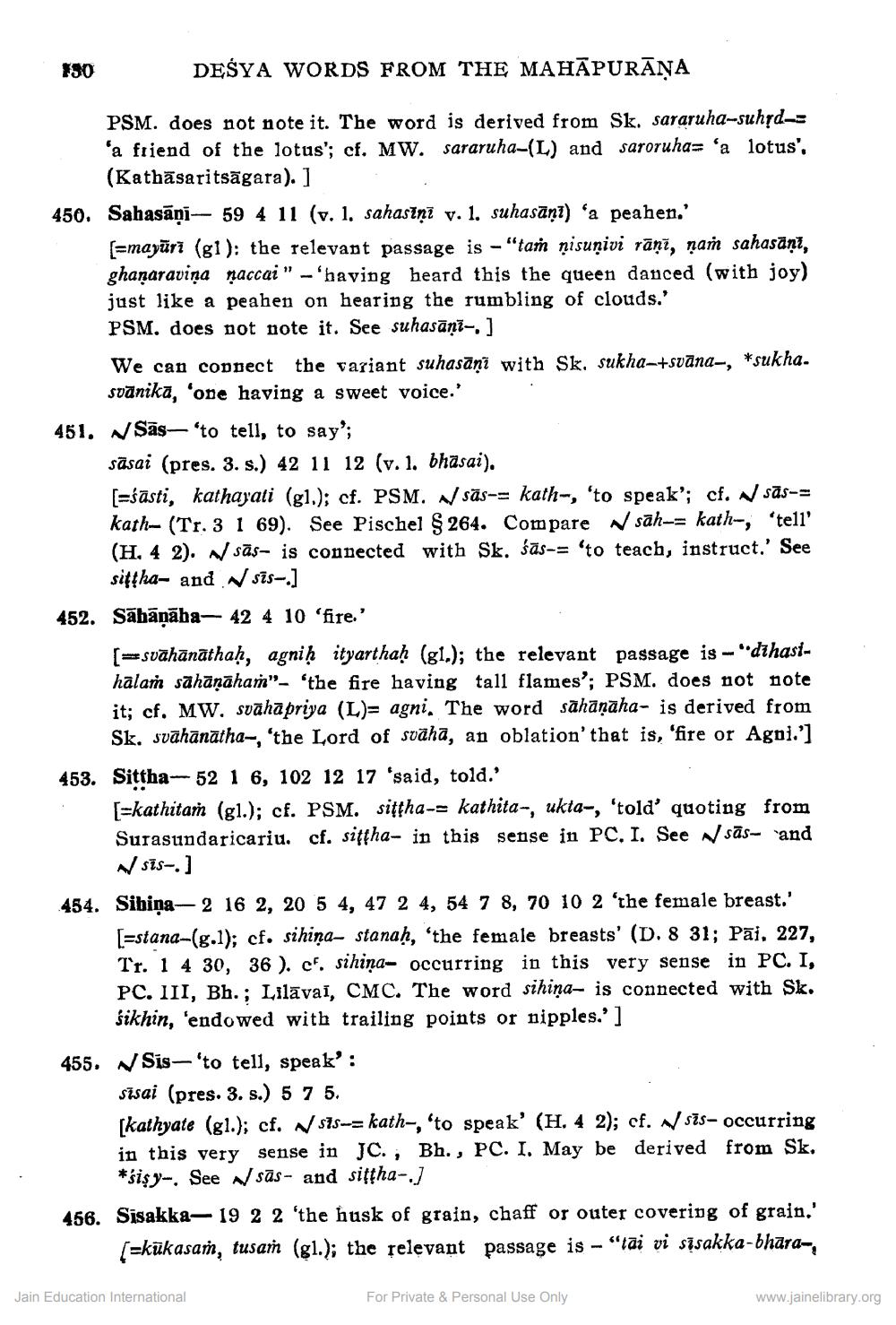________________
150
DEŚYA WORDS FROM THE MAHĀPURĀŅA
PSM. does not note it. The word is derived from Sk. sararuha-suhr-- 'a friend of the lotus'; cf. MW. sararuha-(L) and saroruha= 'a lotus'.
(Kathāsaritsāgara). ] 450, Sahasāni - 59 4 11 (v. l, sahasınž v. 1. suhasāņi) 'a peahen.'
(=mayūri (gl): the relevant passage is - "tam nisuņivi rāņi, ņas sahasāni, ghanaravina naccai" -'having heard this the queen danced (with joy) just like a peahen on hearing the rumbling of clouds.' PSM. does not note it. See suhasāņi- ] We can coppect the variant suhasāni with Sk, sukha +svāna-, *sukha.
svānika, 'one having a sweet voice.' 451.
Sās— 'to tell, to say'; sāsai (pres. 3. s.) 42 11 12 (v. 1. bhāsai). [=śāsti, kathayati (gl.); cf. PSM. sās-= kath-, 'to speak'; cf. sās-- kath- (Tr. 3 1 69). See Pischel & 264. Compare » sāh-= kath-, 'tell' (H. 4 2). sās, is connected with Sk. śās-= 'to teach, instruct.' See
sittha- and sīs-] 452. Sābāņāba- 42 4 10 'fire.'
[=svāhānāthaḥ, agniḥ ityarthah (gl.); the relevant passage is - "dihasihalam sāhāņāham"- 'the fire having tall flames'; PSM. does not note it: cf. MW. svāha priya (L)= agni. The word sāhāņaha- is derived from Sk. svāhānātha-, 'the Lord of svaha, an oblation' that is, 'fire or Agpi.']
453. Sittha- 52 1 6, 102 12 17 'said, told.'
T=kathitam (gl.); cf. PSM. sittha-- kathita-, ukta-, 'told' quoting from Surasundaricariu. cf. sittha- in this sense in PC. I. See » sās- and
sīs-.]
454. Sibiņa- 2 16 2, 20 5 4, 47 2 4, 54 78, 70 10 2 'the female breast.'
[=stana-(g.1); cf. sihina- stanah, 'the female breasts' (D. 8 31; Pāi, 227, Tr. 1 4 30, 36 ). cf. sihina- occurring in this very sense in PC. I, PC. III, Bh.; Lilāvai, CMC. The word sihiņa, is connected with Sk.
sikhin, 'endowed with trailing points or nipples.'] 455. Sis— 'to tell, speak':
sīsai (pres. 3. s.) 5 7 5. [kathyate (gl.); cf. W s7s-= kath-, 'to speak' (H. 4 2); cf. sīs- occurring in this very sense in JC.; Bh., PC. I. May be derived from Sk,
*sisy-. See » sās- and sitpha-] 456. Sisakka-19 2 2 'the husk of grain, chaff or outer covering of grain.'
(=kūkasaṁ, tusaṁ (gl.); the relevant passage is - "iai vi sīsakka-bhara-,
Jain Education International
For Private & Personal Use Only
www.jainelibrary.org




